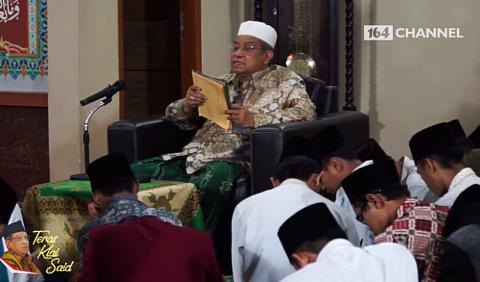It is time for NU clerics to broadcast propagation through their own TV channels
NU Online · Jumat, 9 Juni 2017 | 19:16 WIB
Now a number of kiai have been using Facebook or Youtube to broadcast live on special religious studies that they held during the month full of blessings. This phenomenon has now begun to bloom in Ramadan this year. KH Said Aqil Siroj (Kiai Said) and KH Musthofa Bistri (Gus Mus) are examples of some NU figures having already used internet technology to propagate religious teachings. Gus Mus, has routinely held Ramadhan gathering after tarawih prayers. NU Online once helped contribute by broadcasting it through a chatting facility, then upgraded on Internet radio network. NU Online has aired some public "pengajian" recitations of a number of elderly kiai from various Islamic boarding schools (pesantren). Now the santri in each pesantren are able to handle on how to manage the online broadcast of their kiai.
Kiai and other preachers (da'i) seem to be aware of this changing situation. If in ancient times the teachings were attended directly by tens of thousands of pilgrims who filled the mosque or pesantren area, now the attendees are directly reduced but the number of pilgrims in total is increasing rapidly. But there are some still not willing their pilgrims who come directly to their religious gathering decreased. There is a debate within the internal figures of certain circles that feel their kiaiship diminishes if the pilgrims attending directly decreased if the public recitation is broadcast live because the public is no longer coming, and just listening to the broadcast so that there are some keeping preserving the conventional approach in their propagation (da'wah).
The benefits of using technology for da'wah are numerous. In addition to reaching pilgrims from anywhere effectively and efficiently at the same time, the public recitation material is stored online so that it could be downloaded anytime and anywhere. For example, interesting propagations delivered by Kiai Anwar Zahid are popular material that continues to be downloaded and shared on social media by the public. The number of visitors on some propagations stored on Youtube reaches hundreds of thousands. Another benefit is that preachers (da'i) are likely forced to be creative in finding and delivering their propagations material. It's no secret, many dai have just repeated the same material from one place to another. This is because the pilgrims listening to their propagations are different. Repetition of material on the internet will easily be known so that the dai are considered not creative in their propagation.
The NU kiai must utilize this virtual world stage as good as possible considering this space is a free stage that can be used by anyone, including the radical groups. Religious figures from these groups that previously lacked access to the public are now easily able to reach anyone. With their lectures packed in an interesting way, they can get sympathy from lay Muslims who are passionate about religion. This may be one of the reasons for the strengthening of religious conservatism in Indonesia.
Most humble NU kiai are reluctant to assert themselves because it is not the personality they taught and possessed. But, in the context of maintaining Islam rahmatan lil alamin, this mindset seems to have to be changed, that if the public is not treated with the soothing material of Islamic da'wah, other people or other groups will take a greater use of this technology with material that could inspire their pilgrims to commit radicalism acts or try to undermine the Unitary State of the Republic of Indonesia (NKRI).
To win the public hearts, a kiai does not adequately master the material of religious knowledge, but also must be able to convey it in a way that is pleasing to the viewers. Different stages, between the ones in the real world and in the virtual world have different psychology. In cyberspace, if the material is deemed not to be as expected, in one click, a netizen can move his or her attention to another channel. This is different from the stage in the real world where the pilgrims inevitably have to wait for his propagation to finish. Therefore, the ability to package the material of propagation in cyberspace should be interesting. Public communications science that has been used by the advertising world to attract public attention should also be utilized by the kiai in the world of da'wah.
More importantly, public awareness is required that learning religion is not enough just by listening to propagations on the internet or on television. Studying in-depth through books and holding dialogues with kiai directly about opinions related to certain issues will broaden the horizons of thinking. Only relying on the internet to study religion is prone to growing a rigid and textual religious attitude, especially when most religious propagations only discuss the issue at a glance and mainly only discuss the matter of haram halal, while the issues of the ummah are so complex, so that the solution could not simply be sought through a one-way propagation.
A new era in the way of preaching has begun, Ramadan next year, will mark the increasing number of kiai or ustadz to deliver their propagation through cyberspace. New figures who was previously not popular could have appeared and even become insipring idols. Each of us must be ready with this new world. If ignored, we will likely be abandoned by the times, as previous social or technological changes. (Ahmad Mukafi Niam/Masdar)
Terpopuler
1
Dilantik, Berikut Susunan Lengkap Idarah 'Aliyah JATMAN Masa Khidmah 2025-2030
2
Asyura, Tragedi Karbala, dan Sentimen Umayyah terhadap Ahlul Bait
3
Penggubah Syiir Tanpo Waton Bakal Lantunkan Al-Qur’an dan Shalawat di Pelantikan JATMAN
4
Rais Aam PBNU: Para Ulama Tarekat di NU Ada di JATMAN
5
Gencatan Senjata Israel-Hamas
6
Gus Yahya: NU Berpegang dengan Dua Tradisi Tarekat dan Syariat
Terkini
Lihat Semua















